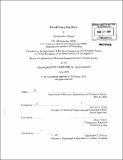Proof-carrying data
Author(s)
Chiesa, Alessandro
DownloadFull printable version (6.240Mb)
Alternative title
PCD
Other Contributors
Massachusetts Institute of Technology. Dept. of Electrical Engineering and Computer Science.
Advisor
Ronald L. Rivest and Eran Tromer.
Terms of use
Metadata
Show full item recordAbstract
The security of systems can often be expressed as ensuring that some property is maintained at every step of a distributed computation conducted by untrusted parties. Special cases include integrity of programs running on untrusted platforms, various forms of confidentiality and side-channel resilience, and domain-specific invariants. We propose a new approach, proof-carrying data (PCD), which sidesteps the threat of faults and leakage by reasoning about properties of a computation's output data, regardless of the process that produced it. In PCD, the system designer prescribes the desired properties of a computation's outputs. Corresponding proofs are attached to every message flowing through the system, and are mutually verified by the system's components. Each such proof attests that the message's data and all of its history comply with the prescribed properties. We construct a general protocol compiler that generates, propagates, and verifies such proofs of compliance, while preserving the dynamics and efficiency of the original computation. Our main technical tool is the cryptographic construction of short non-interactive arguments (computationally-sound proofs) for statements whose truth depends on "hearsay evidence": previous arguments about other statements. To this end, we attain a particularly strong proof-of-knowledge property. We realize the above, under standard cryptographic assumptions, in a model where the prover has blackbox access to some simple functionality - essentially, a signature card.
Description
Thesis (M. Eng.)--Massachusetts Institute of Technology, Dept. of Electrical Engineering and Computer Science, 2010. Page 96 blank. Cataloged from PDF version of thesis. Includes bibliographical references (p. 87-95).
Date issued
2010Department
Massachusetts Institute of Technology. Department of Electrical Engineering and Computer SciencePublisher
Massachusetts Institute of Technology
Keywords
Electrical Engineering and Computer Science.